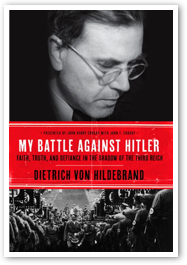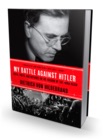A Fateful Decision
- JOHN HENRY CROSBY
"Better to be a beggar in freedom than to be forced into compromises against my conscience." - Dietrich von Hildebrand
 In the early months of 1933, the world watched as Adolf Hitler came to power. On January 30, as election after election saw the Nazi Party gaining seats in the German parliament, he was appointed chancellor of Germany. On February 27 the Reichstag building, the seat of the German parliament, was destroyed in a fire. Hitler quickly exploited the resulting unrest to secure emergency powers and suspend basic rights. Terror ensued and thousands of political opponents were arrested.
In the early months of 1933, the world watched as Adolf Hitler came to power. On January 30, as election after election saw the Nazi Party gaining seats in the German parliament, he was appointed chancellor of Germany. On February 27 the Reichstag building, the seat of the German parliament, was destroyed in a fire. Hitler quickly exploited the resulting unrest to secure emergency powers and suspend basic rights. Terror ensued and thousands of political opponents were arrested.
One German who followed these developments with deepest indignation and sorrow was the philosopher Dietrich von Hildebrand. His heart bled at the thought that his beloved country had "fallen into the hands of criminals." But Hitler's meteoric rise was more than a source of profound grief for von Hildebrand. It confronted him with a decision. Would he remain in Germany or not? Indeed, could he remain? What did his conscience demand? What was God asking of him?
These questions had been on von Hildebrand's mind ever since the Nazi party was born in his hometown of Munich. He was predestined to be an enemy of Nazism, for even before the rise of the movement he had been a vocal opponent of nationalism, militarism, collectivism, and anti-Semitism, the major pillars of the Nazi ideology. Thus the Nazis had already taken note of von Hildebrand in 1921, not because he had attacked them by name, but because he had publicly condemned as an "atrocious crime" the German invasion of neutral Belgium at the start of World War I (1914). His remarks, made at a peace conference in Paris in 1921, created an uproar in the German press. He had violated the nationalist tenet of the Nazi orthodoxy, and for this he was marked for execution and then forced to flee in 1923 when Hitler attempted to seize power in Munich.
By 1933 von Hildebrand had reason to believe that his death sentence of ten years prior had long been forgotten. His decision, then, was based not just on consideration of the dangers he might face but whether he could even remain in the Third Reich. Could he live in a land where the state would legalize countless injustices and where opposition could only lead to arrest and torture?
The answer — or rather, his answer — was no. No, as a philosopher and a Catholic he could no longer stay in Germany. To remain would require a measure of silence and set him on a course of inevitable if gradual acquiescence. This, von Hildebrand believed, was as much at odds with his vocation as philosopher to seek the truth wherever it led, as it was with his Christian vocation to bear witness to the truth no matter the cost.
But von Hildebrand also knew that his decision to "abandon everything" was tied to his unique personal vocation — to "my mission," as he often expressed himself. He knew that not everyone, not even every philosopher, could or should leave Germany. He knew that heroic men like Dietrich Bonhoeffer answered a different call by remaining in Germany and working for the undoing of Nazism from within. He would later support his friends remaining in Germany by encouraging them to nurture a constant "inner rejection" of Nazism and by warning them against the danger of becoming "morally blunted" as a result of living in the midst of an evil regime. But as for himself, he knew that he was called to leave Germany. He knew that he had a particular mission to speak out against Nazism and to help rid Germany and the world of its poison. Where this might lead him he did not know in early March 1933. He abandoned his home, his beloved sisters, his large circle of friends, of a thriving religious and cultural community which gathered for his famous "afternoons" at the family villa on the Maria-Theresia Strasse. In following his conscience and seeking God's guidance, he believed the next step would be revealed to him.
To remain would require a measure of silence and set him on a course of inevitable if gradual acquiescence. This, von Hildebrand believed, was as much at odds with his vocation as philosopher to seek the truth wherever it led, as it was with his Christian vocation to bear witness to the truth no matter the cost.
Von Hildebrand's decision was fateful in the deepest sense of the term. It led him to Vienna, where he would establish the premier German-language journal of intellectual resistance to Nazism and Communism. His uncompromising opposition was felt throughout Austria and even deep into Nazi Germany. Hitler repeatedly demanded the Austrian government to suppress von Hildebrand's journal, and by 1937 he had gained so much attention that the Nazi ambassador in Vienna proposed to Hitler a plan to assassinate von Hildebrand and his collaborators.
One can understand von Hildebrand only up to a point if one does not grasp how radically he lived out of his faith. Indeed, in abandoning Germany, he threw himself into the arms of God. Even as he confidently challenged Nazism on the firm basis of philosophical arguments, the real source of his strength and his amazing peace and joy in those darkest of hours lay in his ever-deepening life of faith. "I had the consciousness that what I was doing was right before God," he later wrote, "and this gave me such inner freedom that I was not afraid."
His story might have been forever lost had it not been for his wife, Alice von Hildebrand. His first wife of forty-five years, Gretchen, died in 1957. She was with him during his struggle against Nazism and supported him unreservedly. In 1959, von Hildebrand married Alice Jourdain, with whom he formed a unique intellectual, spiritual, and cultural partnership. One day she said to him, "Being so much younger" — she was over thirty years his junior — "I deeply regret having missed so much of your life." "Then I will write it for you," he answered, and he began already the next day. He produced five-thousand handwritten pages recounting his life in vivid detail, beginning with his childhood, his youth, his life of faith, his education, and finally his battle against Nazism.
The epic scope of the memoirs can lead one to believe that von Hildebrand was writing for a great unseen audience of future readers. For what he reports, especially from his fight against Nazism, transcends the realm of personal recollections by capturing much of the essence of his time. But the original motive for the memoirs, indeed the original audience was his wife, Alice. We owe her a deep debt of gratitude, not only for instigating the memoir, but for inspiring so much of its intimate and even confessional character.
Dietrich von Hildebrand did not publish his memoirs, nor did he seek to reprint any of his essays against Nazism. In later years he never sought to call attention to his witness in Vienna; he never saw himself as a hero or as someone deserving of special praise. It is a sign of his generous spirit that he left to others the publication of his story. But this volume is truly by him. It is a work of autobiography, of self-revelation.
In preparing this volume we have sought not to make alterations to his canvas; our aim , rather, was to fashion a well-suited frame, above all in the form of concise historical notes, to enable the reader to relive von Hildebrand's story with all the relevant information at hand.
What might von Hildebrand have called this volume? We can never know, and given his humility he might have suggested a title that honored his collaborators rather than himself. But he did, unwittingly, provide the title. Searching the pages of his memoirs, we discovered that he had entitled an outline for part of his memoirs Mein Kampf Gegen Hitler — "My Battle Against Hitler." Thus was the present volume christened.
For all the greatness of von Hildebrand's story, his witness remains little known today. May this volume forever change that. And may his voice be heard again and his courage finally be honored, as a memory and a reminder, yes, but also as a warning and a hope.
 This is Meaghen Gonzalez, Editor of CERC. I hope you appreciated this piece. We curate these articles especially for believers like you.
This is Meaghen Gonzalez, Editor of CERC. I hope you appreciated this piece. We curate these articles especially for believers like you.
Please show your appreciation by making a $3 donation. CERC is entirely reader supported.

Acknowledgement
Johnn Henry Crosby. "A Fateful Decision." from chapter 1 of My Battle Against Hitler: Faith, Truth, and Defiance in the Shadow of the Third Reich (New York: Image, 2014): 1-4.
Excerpted from My Battle Against Hitler by Dietrich von Hildebrand Copyright © 2014 by Dietrich von Hildebrand. Excerpted by permission of Image Books, a division of Penguin Random House. All rights reserved. No part of this excerpt may be reproduced or reprinted without permission in writing from the publisher.
The Author
 John Henry Crosby (b. 1978), is a translator, writer, musician, and cultural entrepreneur. He is founder and director of the Hildebrand Project, which fosters deep cultural renewal through publications, events, fellowships, and online resources that draw on the continuing vitality of Dietrich von Hildebrand's thought and witness. John Henry Crosby is the translator, compiler, and editor of My Battle Against Hitler : Faith, Truth, and Defiance in the Shadow of the Third Reich.
John Henry Crosby (b. 1978), is a translator, writer, musician, and cultural entrepreneur. He is founder and director of the Hildebrand Project, which fosters deep cultural renewal through publications, events, fellowships, and online resources that draw on the continuing vitality of Dietrich von Hildebrand's thought and witness. John Henry Crosby is the translator, compiler, and editor of My Battle Against Hitler : Faith, Truth, and Defiance in the Shadow of the Third Reich.




